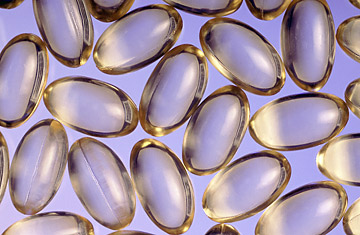
Vitamin E capsules
Wouldn't it be great if preventing cancer were as easy as taking vitamins every day? It certainly makes sense; cancer results from oxidative damage to the DNA of cells, and many vitamins are powerful antioxidants that can curb that dangerous process. That's the theory that two groups of researchers decided to test with respect to prostate cancer. But after more than 13 years of combined study, their answer was, unfortunately, a resounding no: vitamins don't prevent prostate cancer.
In two separate reports, both appearing in the Journal of the American Medical Association, researchers found that men who took vitamins C or E or selenium developed prostate cancer as frequently as men who did not take the vitamins. In one trial, called SELECT, which tested the preventive effects of vitamin E and selenium in more than 35,000 men, participants taking 400 IU of vitamin E daily or 200 micrograms of selenium each day, or a combination of the two, had the same rates of prostate cancer as the placebo group. In the second study, involving more than 14,000 physicians, those taking 400 IU of vitamin E every other day or 500 mg of vitamin C daily also had similar rates of prostate and other cancers as those popping placebo pills. (See TIME's 2008 Year in Medicine.)
"We were very disappointed that [supplements] didn't work to prevent prostate cancer and other cancers," says Dr. Scott Lippman, professor of medicine at MD Anderson Cancer Center and lead author of the vitamin E and selenium study. "But the study illustrates the importance of establishing efficacy before recommending public health usage. There is very high consumption of these supplements, based on the assumption that they do prevent prostate cancer."
Indeed, several earlier studies had hinted that vitamins may protect against prostate cancer (as well as other cancers), but the data were conflicting. In a trial involving 29,000 Finnish subjects in which researchers tested whether vitamin E could reduce lung cancer in smokers, those taking the supplements did not enjoy a lower rate of lung cancer but did develop 34% fewer cases of prostate cancer compared to controls. In the same study, subjects taking supplements that contained a form of selenium also showed a 63% lower risk of developing prostate cancer. But a separate trial of 7,000 heart patients found that vitamin E provided no additional protection against prostate cancer. As for vitamin C, past research has suggested that its potent antioxidant effects may stave off atherosclerosis and help prevent tissue damage that causes heart disease.
So what explains the discrepancies between the results of SELECT and previous studies? For one thing, says Dr. William Nelson, director of the Sidney Kimmel Comprehensive Cancer Center at Johns Hopkins, the participants of the Finnish study were cigarette smokers, and may have suffered more oxidative damage in their cells than the average person. If smoking had caused excessive damage to their cells, then they would be more likely to benefit from any antioxidant effects provided by the vitamin supplements. In other words, perhaps people with lower levels of the vitamin in their blood to start — whether or not it was due to smoking — might benefit more. Nelson's own work in a smaller study in Baltimore suggests this might be true. He showed that the protective effects of vitamin E against prostate cancer followed a U-shaped curve: Men with the lowest levels of the vitamin in their blood lowered their prostate cancer risk when they took supplements, but those with normal levels did not enjoy the same reduction when they boosted their level of vitamin E through supplementation. "We don't want to be in short supply of vitamins that we need," says Nelson, "but over supplementation may not have great benefits."
The SELECT study did not take into account participants' baseline levels of vitamin E, but researchers say they are likely to reanalyze the data in the future to determine whether a subgroup of people with low levels of the vitamin received any benefit from supplements.
There is something undeniably alluring about being able to prevent cancer with a vitamin. More than half of American adults take vitamin supplements, not only to make up for deficiencies in their diet, but also in the hope of staving off diseases like cancer and heart disease. Though these recent trials — including two big studies in November that showed no benefit of vitamins E and C for heart disease, or vitamin D and calcium against invasive breast cancer — don't support that idea, they don't rule out the possibility that getting vitamins from dietary sources rather than supplements could have a more powerful preventive effect, or that taking different doses of supplements might be more beneficial.
Given the large size of these new studies, however, some experts doubt that future research will controvert them. "If the focus is preventing prostate cancer, then there is nothing you can go to the health-food store and get in a bottle," says Dr. Patrick Walsh, a leading prostate-cancer specialist at Johns Hopkins School of Medicine. "Men are fooling themselves if they think that."
